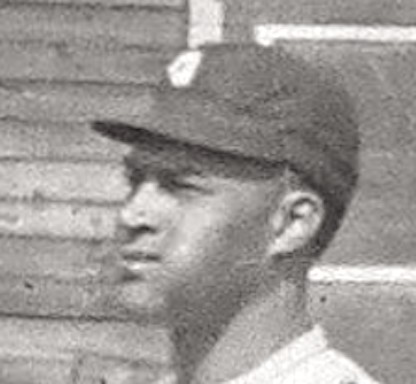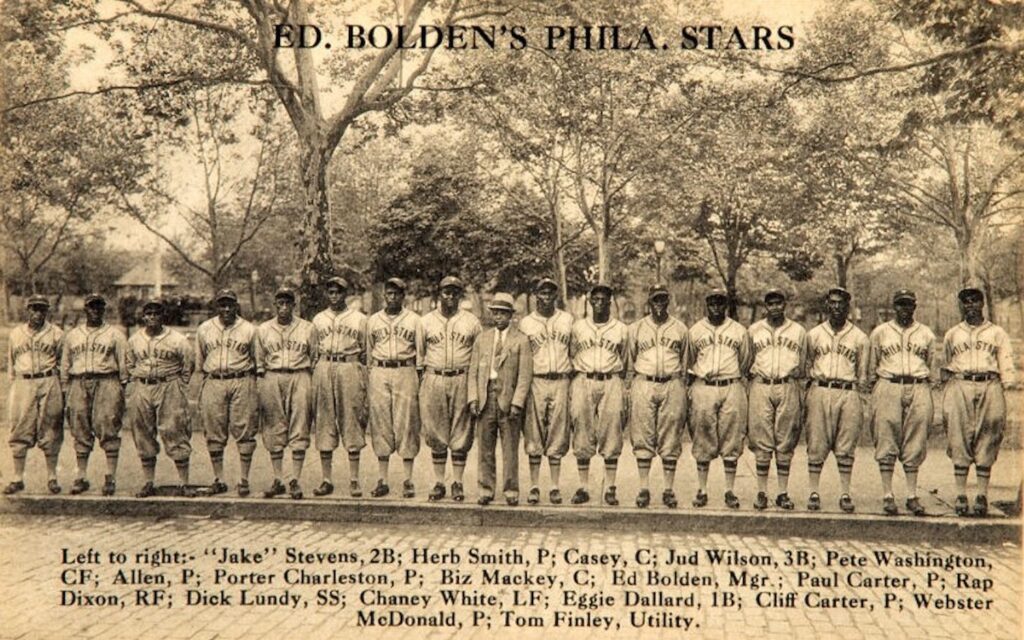
Sport: Baseball
Born: May 6, 1899
Died: November 26, 1933
Town: Winslow, New Jersey
Maurice Julius Dallard was born May 6, 1899 in Winslow, NJ. He was one of one of five children born to William and Josephine Dallard. William worked in a brick factory and later found work as a janitor at a furniture factory after the Dallards moved across the river to Darby and then Sharon Hill, towns southwest of Philadelphia near the current-day airport. At the time this was a thriving African-American cultural hub. Somewhere in his youth, Maurice (or Morris as it appears in places) acquired the nickname “Eggie.”
Eggie stood around six feet tall and was a well-built, fluid athlete with tremendous speed and excellent hand-eye coordination. Baseball was the big sport in his town. A teenage team that started in Darby around 1910 became the Hilldale Daisies, a professional club owned by Ed Bolden—a black post office clerk—that played throughout the region. Eggie, meanwhile, was making a name for himself on the diamond for amateur clubs around Darby and then as an employee at the Baldwin Locomotive Works in nearby Eddystone. At the outbreak of World War I, Eggie registered for the draft but was exempted because Baldwin was a major war contributor, making railroad gun-cars, as well as Remington infantry rifles.
In 1920, Eggie signed to play professionally with the Madison Stars. The Stars were managed by former pitching great Dan McClellan and operated as a farm team for Bolden’s Hilldale club. Eggie was a nimble defender who often caught and played the outfield in the same game. His patience at the plate eventually elevated him to the leadoff spot for the Stars. Among his teammates was infielder Judy Johnson, a future Hall of Famer who was called up to Hilldale in 1921. Eggie also got the call to Hilldale that summer, as a fill-in at catcher. He played a handful of games before returning to the Madison club.
Eggie continued to play the dual role of catcher/outfielder and leadoff man for the Stars in 1922 and then for the Philadelphia Giants in 1923 and 1924. The Giants borrowed their name from the famous club from the early 1900s that co-starred Rube Foster, Pete Hill and Pop Lloyd.
Eggie came to the attention of Ben Taylor, manager of the Wilmington Potomacs of the Eastern Colored League, in 1924. The Potomacs reached out to Eggie and he played one game for them in centerfield at the tail-end of the season, and then batted .306 for the club in 1925. Midway through the 1925 campaign, he was traded to the Baltimore Black Sox, a team led by player-manager John Beckwith. Eggie hit .242 in the final 32 games for Baltimore.
Eggie played most of 1926 with the Black Sox and struggled at the plate, batting under .200. Late that season, he became a member of the Bacharach Giants in Atlantic City. He went 7 for 20 for a .350 average in league games. Eggie had his best power season for the Giants in 1927, slugging 8 homers in 79 games. Reindeer White had a career year at the plate for the team and took over in centerfield, so Eggie manned first base. He provided airtight defense on the right side and hit .280.
At this point in his playing career, Eggie had established himself as someone whose game ticked up a notch in tight situations. He was not the best hitter on his teams, nor the best fielder, and he took big cuts despite lacking home-run power. Yet time and again, he came through with men on base when his more famous teammates did not. Eggie could be overly aggressive and undiplomatic between the white lines, but was well-liked and respected off the diamond.
The Bacharach Giants faced the Chicago American Giants in the World Series and lost the best-of-nine series 5 to 3 with one tie. Eggie batted .278, which was good for third on the club. He reached base 7 times in 11 plate appearances in the final three games, which were played at Inlet Park in Atlantic City.
After a so-so 1928 campaign with the Bacharach Giants, Eggie spent 1929 back with Hilldale, which had joined the new American Negro League. His teammates included all-time greats Oscar Charleston, Biz Mackey, Judy Johnson and Martin Dihigo. Eggie batted leadoff, hit .246 and was among the team leaders in stolen bases and runs scored—on a team with tons of speed. Pitching was the problem for Hilldale, which finished third in the standings.

The Depression hit black baseball hard and the ANL folded after one year. Eggie continued to play for Hilldale, now an independent team barnstorming from town to town. The Daisies joined the East-West League in 1932 but didn’t make it through the year. Eggie finished that season with his old club, the Baltimore Black Sox, batting .327 in the final 13 games. He decided to play closer to his Sharon Hill home in 1933 and joined the Philadelphia Stars, still a strong independent club that played throughout the mid-Atlantic and Northeast.
On a cold, rainy night that November, Eggie was driving across the Grays Ferry Bridge in Philadelphia with his 2-year-old son, Maurice Jr., when his car skidded off the road and plunged into the Schuylkill River. It took divers four hours to recover their bodies.